|
|
|
Sort Order |
|
|
|
Items / Page
|
|
|
|
|
|
|
| Srl | Item |
| 1 |
ID:
124427
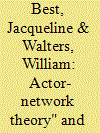

|
|
|
|
|
| Publication |
2013.
|
| Summary/Abstract |
Like any multiplicity, "actor-network theory" is many things: an influential current within the sociology of science and technology; a relational and anti-essentialist form of materialism; an insistence that notions of agency not be confined to human subjects but embrace objects, devices, and other non-human entities; and much else besides.
|
|
|
|
|
|
|
|
|
|
|
|
|
|
|
|
| 2 |
ID:
124429
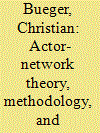

|
|
|
|
|
| Publication |
2013.
|
| Summary/Abstract |
Since its initial formulation in science and technology studies, actor-network theory (ANT) has spread like wildfire throughout the social sciences. Wildfires are fueled by dry and flammable vegetation as well as hot, gusting winds. ANT finds flammable vegetation among those frustrated with many of the conventions, dualisms, and dilemmas of the traditional social sciences. ANT promises to liberate scholars from strict dualisms such as the nature/society divide and the agency/structure dilemma. It claims to open up a reflexive discourse on what constitutes the practice of science. ANT's avant-garde spirit further fuels the fire. Others reject ANT. They (rightfully) lament the often-awkward terminology of ANT, its lack of appropriately defined models and concepts, its literary style of presentation, as well as the radical rhetoric that often comes along with it. For many, the question of what actually constitutes ANT remains mysterious, and it is often unclear whether it is more than a "new materialist" argument for taking objects, things, and technology seriously.
|
|
|
|
|
|
|
|
|
|
|
|
|
|
|
|
| 3 |
ID:
164433
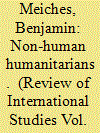

|
|
|
|
|
| Summary/Abstract |
The study of humanitarian intervention typically focuses on the human victims and saviours in armed conflict and natural disasters. Moreover, explanations of the virtues of humanitarian norms and ethics emphasise the importance of the university of suffering and the empathic nature of humanitarian efforts. In contrast, this article explores the neglected world of ‘non-human humanitarians’. Specifically, the article outlines three cases of non-human actors that expand and complicate international humanitarian practices: dogs, drones, and diagrams. Drawing on new materialist and posthuman literatures, the article argues that non-humans possess distinct capacities that vastly expand and transform humanitarian efforts in ranging from relief, to medicine, to conflict resolution. Highlighting non-human humanitarians thus offers a new perspective on the resources available for redressing mass violence and conflict, but also complicates existing definitions of humanitarian norms. To the contrary, the article demonstrates that non-humans often maximise humanitarian services to a degree greater than their human counterparts, but have also introduced changes into humanitarian practices that have problematic unintended consequences. Non-human humanitarians reveals previously discounted participants in international politics and the key roles they play in various international interventions.
|
|
|
|
|
|
|
|
|
|
|
|
|
|
|
|
| 4 |
ID:
135039


|
|
|
|
|
| Summary/Abstract |
Because of the absence of evidence to show for its utility, the notion of ‘development’ has been fraught with many debates over the years. This paper is concerned with re-examining the future of development studies, based on its past and present trajectories. The argument here is that development may be useful if its norms and practices become context-specific and are made to benefit its purported beneficiaries. The chronology spans the period after World War II to the present day, and thus covers theories that envision alternatives. While this chronology is overlapping, we hope to show that development studies has been marked by both continuities and discontinuities.
|
|
|
|
|
|
|
|
|
|
|
|
|
|
|
|
| 5 |
ID:
150012
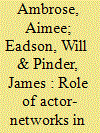

|
|
|
|
|
| Summary/Abstract |
Low carbon heat networks (LCHNs) offer great potential for carbon and heating cost reduction. Despite these benefits, LCHNs provide for just two per cent of heat demand in the UK, when estimates suggest they have the potential to provide for around 43 per cent. These low levels of LCHN provision are in stark contrast to the Nordic nations which exemplify some of the highest quality and most extensive heat networks in the world. It is within this context that the Pioneer Cities project (the project) was launched by the UK government to help local authorities overcome barriers to the deployment of LCHNs. This paper reports the findings of an evaluation of this project, drawing on 86 interviews across five local authorities, analysed using elements of Actor Network Theory (ANT). The evaluation found that the project’s success has been limited. Participating local authorities have encountered challenges regarding marketisation, public sector retrenchment and inexperience in mobilising LCHNs. These factors militate against the formation of the robust actor-networks required to deploy LCHNs. Analysis using ANT reveals insights into why LCHNs remain elusive in the UK and suggests that policy makers need to strengthen local authorities’ ability to lead and deliver complex infrastructure projects.
|
|
|
|
|
|
|
|
|
|
|
|
|
|
|
|
| 6 |
ID:
157784
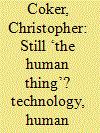

|
|
|
|
|
| Summary/Abstract |
Is war beginning to escape human control? Thucydides tells us the war is one of the things that makes us definitively human; but how long will this continue to be the case as our relationship with technology continues to develop? Kenneth Waltz’s book Man, the State and War affords one way of answering that question. So too does Nikolaas Tinbergen’s framework for understanding human behaviour and Bruno Latour’s Actor–Network Theory (ANT). The main focus of this article is the extent to which we will diminish or enhance our own agency as human beings, especially when we come to share the planet with an intelligence higher than our own.
|
|
|
|
|
|
|
|
|
|
|
|
|
|
|
|
|
|
|
|
|